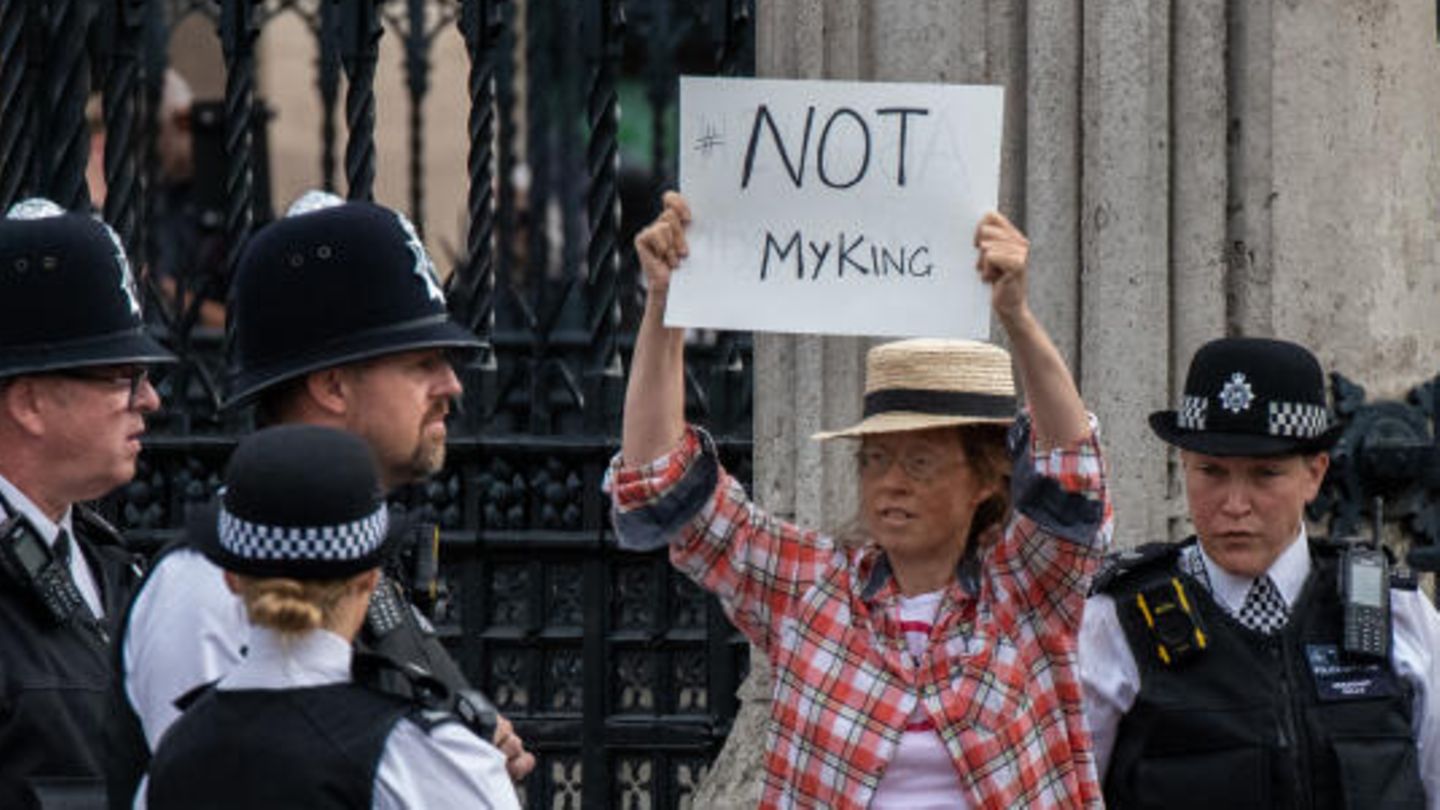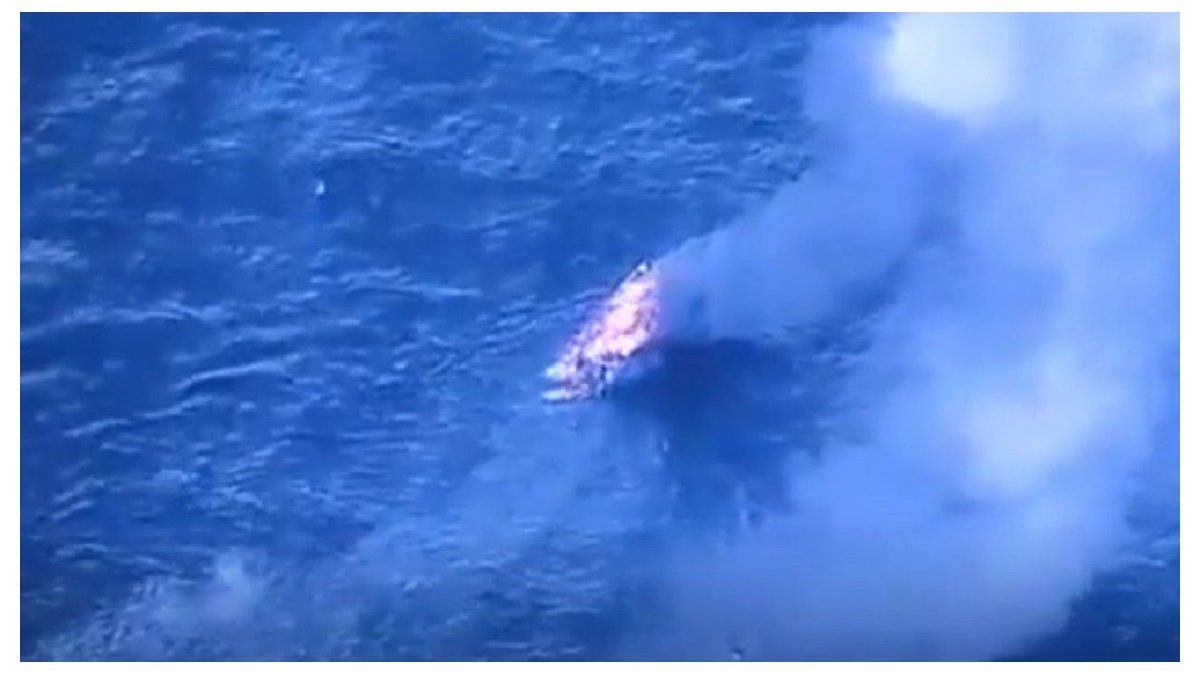Anyone who criticizes the monarchy during the mourning phase for the Queen will quickly find themselves in handcuffs. At least that is what several arrests of protesters suggest. Politicians and civil rights activists express concern about the harsh crackdown by the police.
The death of Queen Elizabeth II shocked many people in Great Britain. But not all Britons mourn. Some see the royal change of power as an opportunity to criticize the concept of monarchy, which is perceived as outdated. But critical voices do not like to be heard in times of ten days of national mourning, as an incident in Edinburgh on Monday shows.
There the newly crowned Charles III. led the funeral procession for his late mother through the Scottish capital to St Giles Cathedral. During the proclamation of the new king, a young woman who had protested with a sign was arrested. It read, “Fuck imperialism, abolish monarchy.” The 22-year-old is now being accused of breaching the peace, said a spokesman for Police Scotland.
Incidents like this are now ringing alarm bells among liberal politicians and civil rights groups. “No one should be arrested for expressing Republican views,” said Labor MP Zarah Sultana. “Extraordinary – and shocking – that this has to be said.”
Several arrests of anti-monarchy opponents in Britain
The case of the arrested 22-year-olds is no longer the only one. On Monday there were several arrests of critics of the monarchy in both Scotland and England. Another protest at the funeral procession in Edinburgh, which also included Prince Andrew, who had to give up his military titles because of allegations of abuse, caused a stir. As he walks by, “Andrew, you’re a sick old man.” The crowd responded with chants of “God save the King” as the 22-year-old was dragged away by police officers and arrested. He is now also accused of “breaching the peace”.
On the same day, a 45-year-old man was arrested in the English university town of Oxford on suspicion of violating public order. During the proclamation of the new king, he had loudly asked “Who chose him?” screamed – and was then taken away by police officers in handcuffs. The man told the newspaper that he was “sad and angry” because he felt “a head of state was being imposed on the British without our consent”. He was later released and “voluntarily” helped the officers, the police said.
In London, a woman was turned away by police officers from the entrance to Parliament after holding up a placard that read ‘Not my King’. A video also went viral of a man on Parliament Square holding up a blank sheet of paper and being asked for his personal information by an officer. The 44-year-old lawyer later explained that the police officer told him he risked being arrested if he wrote “Not my King” on it.
Criticism of the police: “Protest is a fundamental right”
As cases mount, experts warn of a climate of intimidation in the UK. Ruth Smeeth, head of the organization “Index on Censorship”, described the events as “very worrying” and demanded that the royal ceremonies should neither intentionally nor unintentionally restrict citizens’ freedom of expression.
Jodie Beck of the political advocacy group Liberty pointed out that the number of cases comes at a time when the police have just been given a number of new powers. According to this, officials would have the opportunity to impose conditions on public meetings and to intervene themselves if events “cause too much noise”. She criticized the police for using these powers in a harsh and punitive manner. “Protest is not a gift from the state, it is a fundamental right,” affirmed Beck.
Downing Street said it would not comment on individual arrests. However, a spokesman for the new Prime Minister, Liz Truss, stressed: “In general, this is obviously a time of national mourning for the majority, the great, great majority of the country. But the fundamental right to protest remains a cornerstone of our democracy.” The London Metropolitan Police also assured after the cases became public that the public had the right to protest. At the same time, the authority pointed out the “massive challenge” for the police in the royal mass events – especially with regard to the upcoming funeral of the Queen.
The Queen’s funeral becomes the largest police operation in history
The funeral service for Queen Elizabeth II is the first state funeral since 1965, when Winston Churchill, British Prime Minister during World War II, was buried. Hundreds of politicians and dignitaries from all over the world and millions of visitors are expected to attend the funeral in London on Monday. The prominent guest list includes US President Joe Biden, French President Emmanuel Macron, EU Commission President Ursula von der Leyen and the heads of state of the Commonwealth countries.
The funeral service is not only a historic event, but also a huge challenge for the security forces. “This will likely be the largest policing and security operation the UK has ever undertaken,” predicts Nick Aldworth, former National Counter-Terrorism Coordinator, to the newspaper. At the same time, he warned that the police had been “overzealous” in dealing with monarchy critics after the death of the queen and the proclamation of the king – and described the action of some officials as “inappropriate overprotectiveness towards the dignity of the event”.
The security expert is certain that the Queen herself would not have wanted “interference in legitimate protests”. It remains to be seen whether her wish will be followed at her final resting place.
Sources: “”, “”, “”, with DPA and AFP material
Source: Stern
David William is a talented author who has made a name for himself in the world of writing. He is a professional author who writes on a wide range of topics, from general interest to opinion news. David is currently working as a writer at 24 hours worlds where he brings his unique perspective and in-depth research to his articles, making them both informative and engaging.




